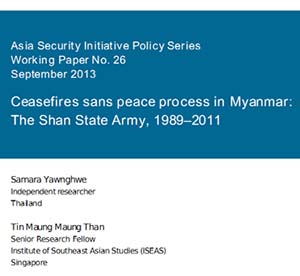Deploring the ongoing conflicts in Shan and Kachin states despite ceasefire being concluded, a paper recently published by Asia Security Initiative (ASI) says the urgent problem is “how to turn ceasefire into a successful and genuine peace process.”

The 21 page working paper “Ceasefires sans peace process in Myanmar: The Shan State Army, 1989-2011” prepared by Samara Yawnghwe and Tin Maung Maung Than note the new ceasefires initiated by the Thein Sein government, “a shift from direct military rule,” are different from those during the 1989-2009 period. They, says the paper:
- are written and not verbal
- are openly reported in the media
- have international interest and support
- have domestic involvement at the highest level of government, and
- facilitation for ceasefire groups to run business enterprises is restricted to legitimate business only
The paper also notes positive developments — the formation of the Myanmar Peace Center (MPC) on 5 November 2012 by the government as well as the Working Group for Ethnic Coordination (WGEC) in June 2012 by ethnic armed groups and civil society organizations.
It sees the presence or absence of the following 4 key factors will affect the eventual success or failure of a peace solution. “Analyses of the ceasefire processes of the past as well as current problems highlight the need for the two sides to be convinced that:
(1) a military solution is not possible
(2) a neutral, trusted third party facilitator of domestic orgin could help manage distrust and negotiate compromise between the parties
(3) centralized political will for peaceful change must be present; and
(4) promises need to be kept
Another recommendation is that “For a genuine peace process to evolve successfully, the state and the army must appear to be obviously separate,” because inhabitants of war zones “consider national government and the army to be the same enemy.”
The paper also draws attention to one blemish in the peace process: “At this time in Yangon itself, there is little awareness among the general populace regarding the situation in the border areas. Public pressure on the government to negotiate is therefore quite low.”
The Shan-Kayah-Mon Trustbuilding for Peace forum held in Taunggyi, 21-23 September, included participants from Lawyers Network, National League for Democracy (NLD), All Burma Students Democratic Front (ABSDF), Democratic Party for New Society (DPNS) and 88 Generation Students, all of whom had called for amendment of the 2008 constitution to pave the way for the emergence of a “Genuine Federal Union”.
For more details, please visit: http://www.rsis.edu.sg/NTS/resources/research_papers/MacArthur_Working_Paper_Yawnghwe.pdf.



